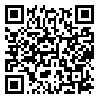Volume 19, Issue 4 (Winter 2025)
jmed 2025, 19(4): 957-970 |
Back to browse issues page
Download citation:
BibTeX | RIS | EndNote | Medlars | ProCite | Reference Manager | RefWorks
Send citation to:



BibTeX | RIS | EndNote | Medlars | ProCite | Reference Manager | RefWorks
Send citation to:
Farsi Z, Azarmi ُ. Outcomes of the Use of Microlearning in Medical Education: A Review Study. jmed 2025; 19 (4) :957-970
URL: http://jmed.ssu.ac.ir/article-1-1534-en.html
URL: http://jmed.ssu.ac.ir/article-1-1534-en.html
Assistant Professor, Military Nursing Department, Nursing School, Aja University of Medical Sciences, Tehran, Iran , azarmi1363@gmai.com
Abstract: (1145 Views)
Introduction: Effective learning results from correct education in an appropriate setting and through creative, inclusive, encouraging methods. This study aimed to investigate the new active approach of microlearning and the consequences of its use in medical education.
Method: This narrative review was compiled by searching Persian and English Iranian and international scientific databases, including SID, Magiran, PubMed, Science Direct, and Scopus, and the Google Scholar search engine, using keywords such as “education,” “learning,” “ microlearning,” “student,” and “medical education,” from 2015 to 2024. The articles selection process was based on the PRISMA diagram, and the quality of the selected articles was assessed using the STROBE and CASP tools. After removing duplicate articles, the titles and abstracts of the remaining articles were reviewed, and unrelated articles were removed. Then, the full text of the 16 articles was reviewed.
Results: The study included 16 articles in total. Microlearning facilitates the teaching-learning process in learners due to its ease of access, flexibility, promotion of active learning, time-saving, and high productivity. Microlearning in medical education can improve learner knowledge acquisition and retention, skills and performance, participation, interest, teamwork, motivation, self-confidence, and satisfaction.
Conclusion: Using the microlearning method in the curriculum of medical sciences students can lead to the improvement of knowledge and skills, change the attitudes of learners, and improve the process of treatment and care for patients.
Method: This narrative review was compiled by searching Persian and English Iranian and international scientific databases, including SID, Magiran, PubMed, Science Direct, and Scopus, and the Google Scholar search engine, using keywords such as “education,” “learning,” “ microlearning,” “student,” and “medical education,” from 2015 to 2024. The articles selection process was based on the PRISMA diagram, and the quality of the selected articles was assessed using the STROBE and CASP tools. After removing duplicate articles, the titles and abstracts of the remaining articles were reviewed, and unrelated articles were removed. Then, the full text of the 16 articles was reviewed.
Results: The study included 16 articles in total. Microlearning facilitates the teaching-learning process in learners due to its ease of access, flexibility, promotion of active learning, time-saving, and high productivity. Microlearning in medical education can improve learner knowledge acquisition and retention, skills and performance, participation, interest, teamwork, motivation, self-confidence, and satisfaction.
Conclusion: Using the microlearning method in the curriculum of medical sciences students can lead to the improvement of knowledge and skills, change the attitudes of learners, and improve the process of treatment and care for patients.
Type of Study: Review |
Subject:
Medical Education
Received: 2024/12/22 | Accepted: 2025/02/25 | Published: 2025/03/16
Received: 2024/12/22 | Accepted: 2025/02/25 | Published: 2025/03/16
Send email to the article author
| Rights and permissions | |
 |
This work is licensed under a Creative Commons Attribution-NonCommercial 4.0 International License. |







